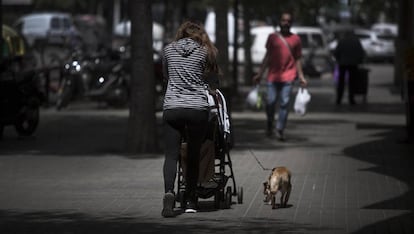Income inequality up in Spain despite recent economic growth
After Portugal, Spanish low-wage earners suffered the greatest salary cuts of all OECD countries

Inequality is one of the biggest consequences of the economic crisis in Spain. The latest Income Inequality Update by the Organization for Economic Cooperation and Development (OECD) shows that between 2010 and 2014, Spanish workers with the lowest salaries suffered the greatest wage cuts of all OECD member states after Portugal.

¡°In Spain, despite the prolonged period of strong job creation, stimulated by the 2012 labor reform, persistently high levels of long-term unemployment, falling real wages and persisting labor market segmentation translated into a sharp fall of labor incomes, especially at the bottom,¡± reads the report, which was released on Thursday.
Spain also has the highest rate of poor workers after Turkey and Chile.
Higher-income households benefited more from the recovery than those with middle and lower incomes
¡°Higher-income households benefited more from the recovery than those with middle and lower incomes,¡± states the study. ¡°The fruits of the economic recovery have not been evenly shared.¡±
In Spain, inequality grew in 2014 even though the economy was growing at a rate of 1.4%. The reports finds that the average Gini coefficient of disposable household income ¨C ¡°a standard measure of inequality that takes the value of 0 when everybody has the same income and 1 when one person has all the income¡± ¨C reached 0.346. In 2007 that figure was 0.324 while in 2012 it was 0.335, according to the OECD.
In 2014, the bottom 10% of workers in Spain earned just 2% of all income in the country while the top 10% earned 24.7%.
Fiscal policy and social transfers are two of the top instruments to fight inequality. The OECD report analyzed redistribution of wealth through subsidies and taxes, and found that in Spain, redistribution grew at the beginning of the crisis, but stalled beginning in 2010.
Less purchasing power
Salaries have been harder hit by the crisis than statistics had suggested to date. Recent data released by the National Statistics Institute (INE) show that between 2008 and 2014 salaries retreated 0.7%, while prices rose 8.5%. This resulted in a 9.2% loss of purchasing power, a figure which topped 10% at the height of the crisis.
A drop in prices coupled with wage raises in 2014 have helped lower that figure somewhat.
The latest INE figures confirm what Spaniards had been saying all along: that the decline in purchasing power has been a lot more intense than what statistics had showed.
English version by Susana Urra.
Tu suscripci¨®n se est¨¢ usando en otro dispositivo
?Quieres a?adir otro usuario a tu suscripci¨®n?
Si contin¨²as leyendo en este dispositivo, no se podr¨¢ leer en el otro.
FlechaTu suscripci¨®n se est¨¢ usando en otro dispositivo y solo puedes acceder a EL PA?S desde un dispositivo a la vez.
Si quieres compartir tu cuenta, cambia tu suscripci¨®n a la modalidad Premium, as¨ª podr¨¢s a?adir otro usuario. Cada uno acceder¨¢ con su propia cuenta de email, lo que os permitir¨¢ personalizar vuestra experiencia en EL PA?S.
En el caso de no saber qui¨¦n est¨¢ usando tu cuenta, te recomendamos cambiar tu contrase?a aqu¨ª.
Si decides continuar compartiendo tu cuenta, este mensaje se mostrar¨¢ en tu dispositivo y en el de la otra persona que est¨¢ usando tu cuenta de forma indefinida, afectando a tu experiencia de lectura. Puedes consultar aqu¨ª los t¨¦rminos y condiciones de la suscripci¨®n digital.










































